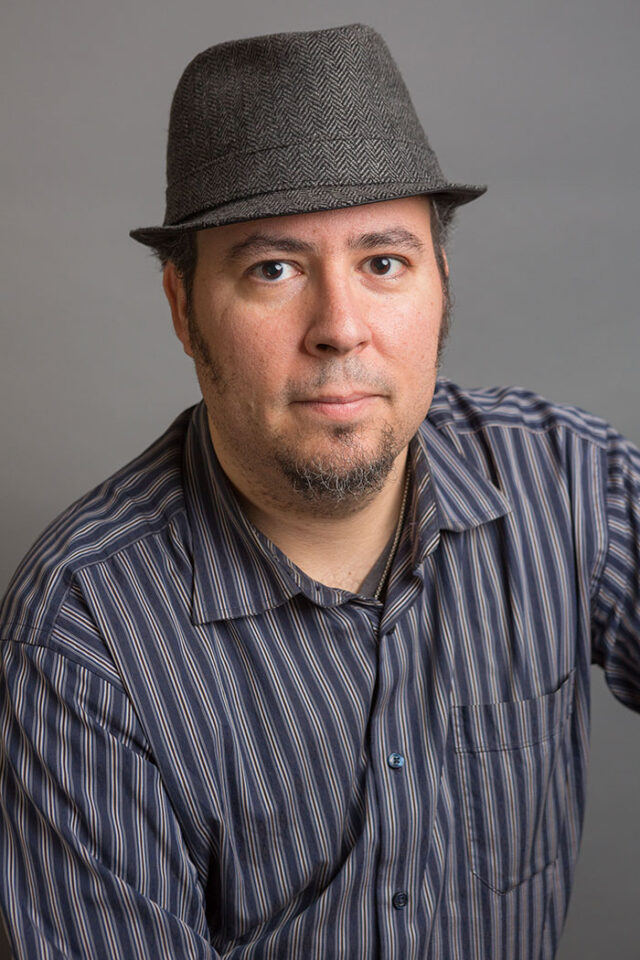
Samuel Torjman Thomas, Ph.D.
Moshe Elmakias
As students finished their second grade chumash performance, drumming excitedly with a big finale for parents and grandparents, in the audience sat Dr. Samuel Torjman Thomas, sharing in this milestone for so many families in our community. For many years now, he has directed the music program in several of our community schools. “To see music education valued in our community schools gives me gratification. Music has a special place in the Jewish tradition, but especially in Sephardi-MizraHi cultures. It goes way beyond parties, to something much deeper.”
Dr. Torjman Thomas is the Director of Musical Arts at the Sephardic Community Center, where he has been rebuilding the Encore music program into a community music school, while also elevating public programming by bringing NYC talent to our local community. In addition to private lessons and group classes at the Center, the Encore Outreach program embeds music programs in private, public, and charter schools and community centers citywide. “We’re in three boroughs already!”

His vision for music education is driven by an intense philosophical focus on what he calls Sephardi Humanism. “I believe that the power of music to bring betterment in the human condition, insinuated in Sephardi Mahshavah (Jewish Thought), expands our sensitivities in so many aspects of how we exist in the world.”
Anyone who knows Dr. Torjman Thomas can tell that he is a fan of stylish hats. His role as the director of Encore is just one of the many hats he wears. A multi-instrumentalist who studied at Berklee College of Music in Boston, he performs professionally on saxophone, oud, and vocals (Hebrew, Arabic, and Ladino), and is a composer and bandleader. His ensemble, Asefa (gathering; collective), has been traversing a wide world of Jewish musics for 25 years, with recordings and concerts worldwide. “I grew up as a jazz musician, playing professionally at a young age in the San Francisco area. But I also had maqam in my ears and this Andalusi-style music from North Africa that my parents would expose me to all the time.” Amidst this, Dr. Torjman Thomas earned a Ph.D. in Ethnomusicology, with a special emphasis on Sephardic Jewish Studies.
For nearly two decades, he has been a professor of Music and Sephardi Studies at CUNY (Hunter and John Jay Colleges). He has also worked closely with the American Sephardi Federation as a research fellow for many years. His book Redefining Diaspora Consciousness (CUNY, 2014) tells the significant story of the Moroccan community in Brooklyn from an anthropological and musical perspective, contextualizing the musical practices in Brooklyn synagogues in relation to the more locally prominent Syrian-influenced musical practices. In 2007, he and his wife Hayley relocated to the Madison-Homecrest neighborhood. “As someone who grew up as a proud Sephardic Jew, listening to all kinds of Arabic music and knowing my roots, in a sense I needed to come home!”

He mentioned several close confidantes in the community, rabbis and cantors that helped guide his understanding and led to a production years ago for WNYC radio called Performing Piyyutim. For this, Asefa was joined by Rabbi Joseph Dweck and Rabbi Gad Bouskila. “This program showed how rich Jewish musical culture is in this city, with an emphasis on learning and discovery.” It seems that no matter what is happening in his concertizing, the educational impetus is never too far afield.
In 2014 he founded the New York Andalus Ensemble, a communal choir made up of people from different ethnic backgrounds singing together in Hebrew, Arabic, Spanish, and Ladino. He calls it a kind of educational activism, threading a tight needle in today’s charged political climate in his public performance and academic work. “In my Sephardic Literature class at CUNY, at one point we read a passage from Saadia Gaon’s Book of Beliefs and Opinions where he echoes a chapter from the Ikhwan al-Safa on the power of music – on rhythm in particular – to expound on the nature of blending, of balance, as a means for strengthening one’s middot. What inspires me is the light that goes on in students, Jewish, Muslim, and otherwise – after all, its CUNY and CUNY is super diverse – who find something deeply human to connect with around a tidbit of music. They see themselves in each other. That’s what continues to drive me: the possibility of music to bring different people together!”

His multifaceted background informs his work, in our community and beyond. “I am committed to seeing the next generation of our children add to their capabilities in a Torah life by appreciating the power of music.” As he works to grow the Encore Community Music School, he says, “our schools and parents have been so supportive, and a growing number of students are taking note. I’ve been particularly proud, especially in the past year, to have a music faculty that includes several teaching artists from Israel. I hope we have created a home for these folks, that will pay dividends for generations. Not everyone will be a professional player or performer, but all of us should be discerning.”
Moshe Elmakias, Pianist and DMA Candidate at Stony Brook University, Encore Music Faculty at the Center and Yeshivah of Flatbush



